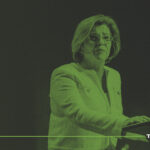The following is an uncorrected transcript generated by a transcription service. Before quoting in print, please check the corresponding audio for accuracy.
Erik Thoennes: Brokenness is a category that we use to describe the effects of sin, I would say, along with woundedness, and insecurity, and a difficulty in loving people, and being loved, and receiving love, and having a positive sense of who we are. But sin needs to be defined in relation to God, and if not, we’re really missing the definition of sin.
So, sin is offense against a holy God because of our rebellion against Him, and that’s where sin needs to start in its definition. And then it’s great to talk about all the effects sin has on us and be sympathetic toward those and help to alleviate those. But the solution to sin has to start with the problem we have with God that David’s right when he says in Psalms 51, “Against you, only you, have I sinned and done what is evil in your sight.”
Jeremy Treat: Yeah. So, I think in this question there’s a tension that we have to understand our terms a little bit but I think there’s a danger in this for preachers of being able to talk about brokenness without talking about sin, of a way of appealing to the pain, the suffering, the difficulty of life, but in a way that doesn’t necessarily call people out for their role in that.
So, I don’t know. How do you feel like you’ve seen this play out in culture? I certainly have.
Thoennes: Well, something like the doctrine of hell, which is a direct result of God’s wrath and hatred of all sin and evil which we want God to have, you don’t really have a category for it if all we talk about is the effects of sin on us and God isn’t the main issue with sin.
And so, even having a category for those attributes of God, for His judgment of sin in hell, for instance, we really struggle with it. But if we start with a holy God who, of course, hates sin, then and only then will the cross make sense because the cross is not just God’s love, it’s God’s justice. It’s His wrath on display as well.
And so, for the cross to make sense, for the gospel to make sense, we’ve got to start with a God who hates sin and evil and judges it, and I know you’ve done a lot of work in the atonement and the atonement, I think, has been deeply affected in the way people want it to be rather than how it really is in the Bible because we don’t start with a holy God who, of course, hates and judges sin and curses it on a cross.
Treat: Yeah. And if we don’t talk about how bad the bad news is then we won’t appreciate how good the good news is. And that’s why I think we do have to…we have to understand the weight of sin and sin being rebellion against God and an attempt to replace God with other things as well.
I do think that there’s a place, then, to talk about brokenness and that’s a really helpful category, not when it replaces talking about sin, but when it helps us understand more broadly the holistic effects of sin.
Thoennes: Right. Because the Bible’s packed with God’s empathetic care for how sin has damaged His people and moving toward them in that and we should do the same, but not as something, as you say, people will like hearing because we’re recognizing how hard life has been on them in a fallen world, but if we don’t address the fundamental problem of our offense against a holy God in our sin, we’re going to miss the true gospel message and what’s ultimately best for our brokenness and our woundedness and will give true healing in those ways.
Treat: Yeah. Here’s how this has played out for me really practically as a pastor and as a preacher. When I’m preaching, I want to be able to call people to scripture to see the holy love of God and to acknowledge their own sin. But what I’ve also felt the weight of increasingly over time is that the suffering and the pain that people experience isn’t only a result of their own sin, but also a result of the sin of others placed upon them.
And so, I feel like the category of brokenness is helpful in being able to say to people, “You have sinned and Christ has born the guilt of your sin on the cross. But you have also had the sin of others placed upon you and that shame placed upon you and Christ has borne that shame as well.”
So, to me, I think being able to speak to people holistically in the responsibility of their own sin but also recognizing the sin of others. That’s especially true when it comes to victims of abuse and those who have really been marginalized and are victims, truly victims, to be able to see God’s grace towards them, not in a way that dismisses their own sin, but acknowledges the sins of others.
Thoennes: Right. So, if we use words, hurt, wounded, broken, suffering, only, we won’t get to the ultimate issues we need to in the lives of those people and we may feed a victim mentality people may have, where they’re not willing to own that they’re not just victims but victimizers as well, and part of the problem, not just affected by the problem.
Treat: Yeah. I think if we don’t talk about sin, too, it also doesn’t allow us to call the oppressors to justice. If we’re just talking about brokenness, general kind of “the world isn’t the way it’s supposed to be,” it doesn’t allow us to say the people who are oppressing, that’s sin and they need to be held accountable.
So, I think it’s…we’ve got to understand the weight of sin but be able to apply it in the right ways, and brokenness, again, as a holistic way of seeing the effects of sin, has a place in that.
Thoennes: So, let me ask you this. You used a term before. “You need to talk about the bad news before you talk about the good news.”
In light of what we’re saying then, is it even helpful to use a term like bad news for that because without that, you don’t get to the good news. But isn’t it all good news when we’re telling people the truth?
Treat: Yeah. Well, no, it’s good. I think about it like going to the doctor who’s going to give you a diagnosis, right?
And so, if you’re going in and you have a heart condition and the doctor…the best, most loving, most truthful thing they can do is to say, “You’ve got a problem with your heart.” If the doctor said, “You know what? You’re okay. Just put a bandaid on it. Keep going.” That’s unloving. So, it’s hard news.
Thoennes: Hard news. Hard to hear. Yeah.
Treat: Yeah. But it’s loving. It’s gracious. And at the end of the day, it’s comforting, too. You talk with people who have been sick and who the doctors can’t diagnose it, and finally, when they figure out what it is, there’s a sense of relief of, “Oh, now I know what this is. Now I know what the remedy could be to it.” So, in that sense, I do think the diagnosis of sin ultimately points us to the remedy, and for that, it’s grace.
But it’s hard news to receive nonetheless.
Thoennes: Right. So, any pastor, preacher, teacher, who doesn’t shoot straight with us about the reality of our problems should be sued for spiritual malpractice.
Treat: That’s right.
Thoennes: If they don’t tell me the truth, what’s worse than a doctor who doesn’t tell you the truth?
Treat: That’s right.
But I think that also comes with helping people understand what health is and that’s where some preachers could have a danger of leading with sin. Then I don’t think that sin… I don’t think the bad news in that sense is the place even to start with. We’ve got to be able to see God’s character, His holiness, His love, His wisdom, His power, what He created us for, to be able to really understand even the depths of our sin, you have to have that context of God’s character, of His purposes in the world.
 We need one another. Yet we don’t always know how to develop deep relationships to help us grow in the Christian life. Younger believers benefit from the guidance and wisdom of more mature saints as their faith deepens. But too often, potential mentors lack clarity and training on how to engage in discipling those they can influence.
We need one another. Yet we don’t always know how to develop deep relationships to help us grow in the Christian life. Younger believers benefit from the guidance and wisdom of more mature saints as their faith deepens. But too often, potential mentors lack clarity and training on how to engage in discipling those they can influence. 
































